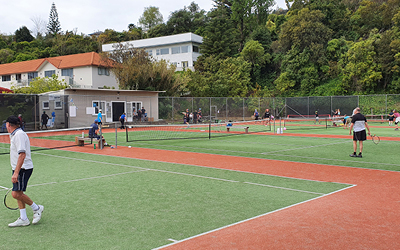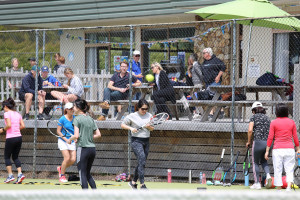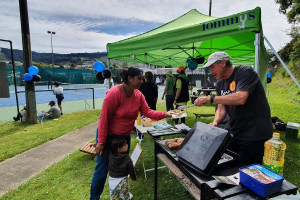Guide to funding applications and planning
Introduction
Funding grants from charitable trusts provide our local clubs with many of the funds needed to operate stable clubs. Reliance on these funds leaves clubs financially vulnerable if they do not have experienced volunteers or staff to complete the applications.
Before you begin
Before you attempt any funding applications you need a plan. Your club committee should create a wish list of the things they would like to achieve or purchase during the year. This should then be divided up and prioritised into needs and wants. After prioritising these the club should create a budget to work out how much funding they need and what percentage of these funds they wish to acquire from funding grants. Ideally this plan should be developed during the off season (May - Sept), as this will allow plenty of time prior to pre-season for your club to apply for and receive things they need to start the season. The application and approval process can take anywhere from 2 weeks to 3 months, this varies between providers. A good way to manage this is to create a timeline of what you want and when you want to get it and assign funding providers that will allow you to achieve this. Using a funding plan and budget template will allow you to share the planning amongst your team.
Some projects/costs may not be able to be covered by grants, research what grants are available in your area and the criteria for each funder. You can also view online which organisations have received grants and how much they received in a financial year. This can be found on the websites of most trusts.
Sport NZ link to local funding trusts

Funding applications require detailed information about your club and numerous documents to prove the information is correct. The documents required can vary between providers. Below is a list of the commonly required information and documents. It is a good idea to keep digital copies of all this information in one easy to access location so that you can quickly provide it if necessary. If applicable, documents should be on a club letterhead, signed and dated. Include the official positions of the signatories. Online applications will require you to change the name of the file to a specific title like “Accounts 2021”, make sure you read the fine print when you get to the document upload section.
Contacts
Your club will have to provide the name and contact details of 2 or 3 persons that represent the club, that can be contacted regarding your application. Often this is the President/Treasurer/Secretary or other executive member of your club, as well as the person who completes the applications. Most online forms require the applicant to create their own personal online profile. Some providers require digital copies of photo ID of the club contacts, you should keep these on file .
Club Certification
In most instances you will be required to prove that your club is an Incorporated Society or registered Charity (most sports clubs are these). This will require you to provide a copy of your certificate of incorporation or charitable status certificate, which displays your incorporated societies or charity number, which you will also need to input. Applications will require you to enter the full legal name of your club, this will be the name on this certificate. E.g. “Sunny Tennis Club Incorporated”.
If you don’t have all of these details you can search the registers here:
Incorporated Societies Register: http://is-register.companiesoffice.govt.nz
Charities Register: https://www.charities.govt.nz
Constitution
Some, but not all providers will require a copy of your constitution. It is a good idea do have this on hand as sometimes it is specially requested by providers doing accountability checks. Make sure this is an up to date copy and any amendments that have been made to the constitution should be included in this. If your club does not have a constitution this shouldn’t typically be a barrier to applying for funding – unless it is explicitly stated as a requirement.

Often you will be asked to provide a letter of affiliation to your regional body. This should come from your local region or association. One letter can be kept on file and used for multiple applications.
Additionally you may be asked to provide another letter of support. These should come from a suitable community group or organisation that supports the work that your club does within the community. Good examples of these are local primary, secondary or tertiary education providers. Other ethnic or community groups that provide support for sections of society such as families, international students, refugees or less privileged. It could be a disability group if you have wheelchair friendly facilities and play at your club.
Here’s an example:
“(Name of Supporting organisation) would like to support (Name of Club) in their funding application. Our relationship with them has been a positive one over the years and we recognise them as a valued part of our community.
(Name of Club) is a well-established club and provides a place for (supporting organisation) members to play, learn and improve the quality of their tennis activity. We have a reciprocal arrangement to share resources and facilities when needed, which has proved beneficial for both parties.
(Supporting organisation) gives their endorsement and support to any funding application made by Sunny Tennis Club, to any funding agency, in their efforts to promote and provide tennis opportunities for their members.”
G.S.T
You will need to know your GST number for many of the funding providers. All applications must be GST exclusive, as this is not an actual “cost” to the club. Some clubs are not GST registered, and if this is the case you can simply state this on the application.
Deposit Slip
You will need to provide a scanned copy of a bank deposit slip showing your account name and account number. This should be the account you wish the funds to be deposited into if your application is approved. It is important to note that when accountability is required the funds that are used need to be clearly shown in your bank statements as exiting the same account. If you don’t have a bank deposit slip, they can be provided by your bank.
Tax Exemption Certificate
Many of the application forms ask you to provide a tax exemption certificate. As a non-profit incorporated society, you do not have to pay tax, and as such do not require a tax exemption certificate. However, if you do have a tax exemption certificate for some reason, then you will need to provide it.
Financial Report
You will be required to provide a copy of your club’s most recent financial report, which is often the previous end of year report provided at your AGM. This is usually compiled by the club treasurer and signed and dated as a true and correct record by 2 executive members. Sometimes you will be asked to provide an audit report of the club’s financials. The incorporated societies act does not require your books to be audited. However, many constitutions require that the finances be audited yearly. If your constitution does NOT state that an audit must be completed, then you do not need to do this. You will sometimes need to provide a copy of your constitution to prove that you don’t need to audit your own books.
If your constitution does require an audit, then you will need to provide an audit report from a registered accountant to compete your funding application.

When you receive funds, you will be required to provide proof that you used them for the purpose specified in the application. This will usually be in the form of bank statements to show the grant money going into your club account and then going out to the specified recipient’s account. You will also need to provide receipts or invoices showing that the payment has been received by the recipient. Accountability reports are usually due within 3 months of receiving any funds. It is important that these are completed promptly as failure to complete this will prevent you from submitting further applications.
Many funders will provide warnings via email of impending deadlines for accountability. If for any reason you have not yet spent all of the funds, but intend to do so, we recommended getting in touch with the funder in advance of the deadline – in most cases they will be happy to provide an extension.
Resolution
A resolution is a motion that was passed at your club’s executive committee meeting to apply to a specific trust for funding. It needs to be on your club letterhead, dated and containing details regarding who you are applying to, how much you are applying for and what the funds will be used for. It will also include name and signatures of 2 club executives (President and Treasurer are best) stating that the resolution is true and correct.
Here is an example of appropriate wording:
“At the committee meeting on the (date), the committee approved that an application be made to (name of trust) for ($ requested) for the purchase of equipment for Junior teams at Sunny Tennis Club.
We declare that this is a true and correct record of a resolution passed at that meeting.
Name: Date: Position:”
Minutes
Sometimes you may be required to supply a copy of the minutes of the executive meeting that the resolution was passed at. This may be instead of a resolution or as well as. Either way, it is advisable to keep a copy of the minutes on hand. These will need to be signed and dated stating they are a true and correct record.
Example:
“We declare that this is a true and correct record of the committee meeting held on the (date).”
Quotes
If you are applying for funding to purchases goods, you will be required to supply 2 independent quotes for the goods, including a full breakdown of individual item costs. One of these quotes will be nominated as the preferred quote, this should be the cheapest option, and will be the one that the provider chooses to supply funds for. The freight and GST costs cannot be included in the amount of funding requested. When budgeting, your club will need to allocate funds from other sources to cover this. Most funders require the quotes to be less than 3 months old, so ideally acquire updated quotes close to the time of submitting your application.
Contracts
If you are applying for salaries or wages for staff (usually administrative roles) then you will be required to provide a job description and signed employment contract for each staff member. The contract needs to include time frames and amounts to be paid. These details will vary depending on whether your staff are self-employed or PAYE waged employees. Usually it is easier for smaller clubs to pay their staff via invoices and leave the tax responsibilities to the earner, rather than deal with PAYE paperwork. At this point it should be noted that applications cannot be submitted retrospectively for funds that have already been spent, so when applying for funding for wages/salaries this should be done prior to the employee contract start date where possible as it makes the application and accountability process easier.
In many cases, the person making the application is not allowed to apply for their own salary/wages, you should check this with the individual providers.
Not all funders will cover salaries or wages, so it pays to review the grants criteria on their website. If you’re still not sure, you can email or call them to enquire.

Many funding organisations will require you to sign a declaration of authenticity to apply or a consent to audit or an agreement to terms and conditions. This may be embedded as part of the application process online or may require you to download and sign an additional form. This is self-explanatory when you get to these sections and will vary greatly between providers, but usually requires details or signatures of 2 contact persons representing your club.
Information Storage
Once you have collated all the required documents you should store them in an easy to access location on a hard drive and in the cloud. You should sort these into folders according to which Trust you applied to. Generic documents and templates can be stored in a separate folder, so you always have the original copy and file name. You should also set up folders for each Trust in your email account to store any correspondence.
Cover letter
Including a cover letter with your application is a great way to provide more detail on the project or item you are hoping to have funded, as well as providing general information on your club and its role within the community. Be as bold as you like and try to provide clear evidence as to why you need support - for example including photos of court degradation, or outlining safety concerns, is a great way to demonstrate a need for them to be re-surfaced.
Its important to plan!
We recognise that funding grants are vital to the financial stability of local clubs and hope this step-by-step process will assist your club with achieving your goals. One piece of advice that is possibly the most important; create a long-term plan!
Download the above information as a printable .pdf
Or have a look below for more tips and ideas
Source: Clay Wilhelmus, adapted by Tennis NZ




































